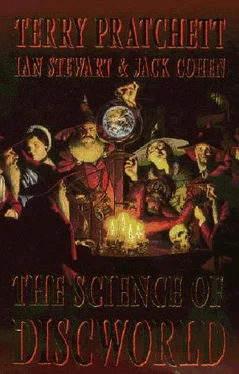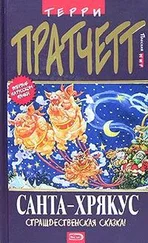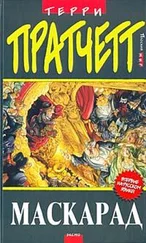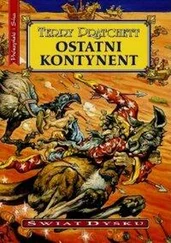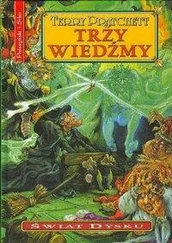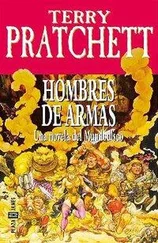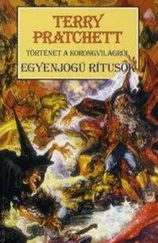Terry Pratchett - Science of Discworld
Здесь есть возможность читать онлайн «Terry Pratchett - Science of Discworld» весь текст электронной книги совершенно бесплатно (целиком полную версию без сокращений). В некоторых случаях можно слушать аудио, скачать через торрент в формате fb2 и присутствует краткое содержание. Жанр: Фантастика и фэнтези, на английском языке. Описание произведения, (предисловие) а так же отзывы посетителей доступны на портале библиотеки ЛибКат.
- Название:Science of Discworld
- Автор:
- Жанр:
- Год:неизвестен
- ISBN:нет данных
- Рейтинг книги:4 / 5. Голосов: 1
-
Избранное:Добавить в избранное
- Отзывы:
-
Ваша оценка:
- 80
- 1
- 2
- 3
- 4
- 5
Science of Discworld: краткое содержание, описание и аннотация
Предлагаем к чтению аннотацию, описание, краткое содержание или предисловие (зависит от того, что написал сам автор книги «Science of Discworld»). Если вы не нашли необходимую информацию о книге — напишите в комментариях, мы постараемся отыскать её.
Science of Discworld — читать онлайн бесплатно полную книгу (весь текст) целиком
Ниже представлен текст книги, разбитый по страницам. Система сохранения места последней прочитанной страницы, позволяет с удобством читать онлайн бесплатно книгу «Science of Discworld», без необходимости каждый раз заново искать на чём Вы остановились. Поставьте закладку, и сможете в любой момент перейти на страницу, на которой закончили чтение.
Интервал:
Закладка:
I KNOW MY WIZARDS
IT DID NOT TAKE LONG for the faculty to put its collective finger on the philosophical nub of the problem, vis-a-vis the complete destruction of everything.
'If no one will know if it happens, then in a very real sense it wouldn't have happened,' said the Lecturer in Recent Runes. His bedroom was on one of the colder sides of the university.
'Certainly we wouldn't get the blame,' said the Dean, 'even if it did.'
'As a matter of fact,' Ponder went on, emboldened by the wizards' relaxed approach, 'there is some theoretical evidence to suggest that it could not possibly happen, due to the non-temporal nature of the thaumic component.'
'Say again?' said Ridcully.
'A malfunction would not result in an explosion exactly, sir,' said Ponder. 'Nor, as far as I can work out, would it result in things ceasing to exist from the present onwards. They would cease to have existed at all, because of the multidirectional collapse of the thaumic field. But since we are here, sir, we must be living in a universe where things did not go wrong.'
'Ah, I know this one,' said Ridcully. 'This is because of quantum, isn't it? And there's some usses in some universe next door where it did go wrong, and the poor devils got blown up?'
'Yes, sir Or, rather, no. They didn't get blown up because the device the other Ponder Stibbons would have built would have gone wrong, and so ... he didn't exist not to build it. That's the theory, anyway.'
'I'm glad that's sorted out, then,' said the Senior Wrangler briskly. 'We're here because we're here. And since we're here, we might as well be warm.'
'Then we seem to be in agreement,' said Ridcully. 'Mr Stibbons, you may start this infernal engine.' He nodded towards the red lever on the plinth.
'I was rather assuming you would do the honours, Archchancellor,' said Ponder, bowing. 'All you need to do is pull the lever. That will, ahem, release the interlock, allowing the flux to enter the exchanger, where a simple octiron reaction will turn the magic into heat and warm up the water in the boiler.'
'So it really is just a big kettle?' said the Dean.
'In a manner of speaking, yes,' said Ponder, trying to keep his face straight.
Ridcully grasped the lever.
'Perhaps you would care to say a few words, sir?' said Ponder.
'Yes.' Ridcully looked thoughtful for a moment, and then brightened up. 'Let's get this over quickly, and have lunch.'
There was a smattering of applause. He pulled the lever. The hand on a dial on the wall moved off zero.
'Well, we're not blown up after all,' said the Senior Wrangler. 'What are the numbers on the wall for, Stibbons?'
'Oh, er ... they're ... they're to tell you what number it's got to,' said Ponder.
'Oh. I see.' The Senior Wrangler grasped the lapels of his robe. 'Duck with green peas today, gentlemen, I believe,' he said, in a far more interested tone of voice. 'Well done, Mr Stibbons.'
The wizards ambled off in the apparently slow yet deceptively fast way of wizards heading towards food.
Ponder breathed a sigh of relief, which turned into a gulp when he realized that the Archchancellor had not, in fact, left but was inspecting the engine quite closely.
'Er ... is there anything else I can tell you, sir?' he said, hurriedly.
'When did you really start it, Mister Stibbons?'
'Sir?'
'Every single word in the sentence was quite short and easy to understand. Was there something wrong about the way I assembled them?'
'I ... we ... it was started just after breakfast, sir,' said Ponder meekly. 'The needle on the dial was just turned by Mr Turnipseed by means of a string, sir'
'Did it blow up at all when you started it up?'
'No sir! You'd ... well, you'd have known, sir!'
'I thought you said back there that we wouldn't have known, Stibbons.'
'Well, no, I mean...'
'I know you, Stibbons,' said Ridcully. 'And you would never test something out publicly before trying it to see if it worked. No one wants egg all over their face, do they?'
Ponder reflected that egg on the face is only of minor concern when the face is part of a cloud of particles expanding outwards at an appreciable fraction of the speed of dark.
Ridcully slammed his hand against the black panels of the engine, causing Ponder visibly to leave the ground.
'Warm already,' he said. 'You all right up there, Bursar?'
The Bursar nodded happily.
'Good man. Well done, Mister Stibbons. Let's have lunch.'
After a while, when the footsteps had died away, it dawned on the Bursar that he was, as it were, holding the short end of the string.
The Bursar was not, as many thought, insane. On the contrary, he was a man with both feet firmly on the ground, the only difficulty being that the ground in question was on some other planet, the one with the fluffy pink clouds and the happy little bunnies. He did not mind because he much preferred it to the real one, where people shouted too much, and he spent as little time there as possible. Unfortunately this had to include mealtimes. The meal service on Planet Nice was unreliable.
Smiling his faint little smile, he put down his axe and ambled off. After all, he reasoned, the point was that the wretched thing stayed out of the ... whatever it was, and it could certainly do a simple job like that without his watching it.
Unfortunately Mr Stibbons was too worried to be very observant, and none of the other wizards bothered much about the fact that everything which stood between them and thaumic devastation was blowing bubbles into his glass of milk.
SCIENCE AND MAGIC
IF WE WANTED TO, we could comment on several features of Ponder Stibbons's experiment, describing the associated science. For example, there is a hint of the 'many worlds' interpretation of quantum mechanics, in which billions of universes branch off from ours every time a decision might go more than one way. And there is the unofficial standard procedure of public opening cere-monies, in which A Royal Personage or The President pulls a big lever or pushes a big button to 'start' some vast monument to technology, which has been running for days behind the scenes. When Queeh Elizabeth II opened Calder Hall, the first British nuclear power station, this is just what went on, big meter and all.
However, it's a bit early for Quantum, and most of us have forgotten Calder Hall completely. In any case there's a more urgent matter to dispose of. This is the relation between science and magic. Let's start with science.
Human interest in the nature of the universe, and our place within it, goes back a long, long way. Early humanoids living on the African savannahs, for instance, can hardly have failed to notice that at night the sky was full of bright spots of light. At what stage in their evolution they first began to wonder what those lights were is a mystery, but by the time they had evolved enough intelligence to poke sticks into edible animals and to use fire, it is unlikely that they could stare at the night sky without wondering what the devil it was for (and, given humanity's traditional obsessions, whether it involved sex in some way). The Moon was certainly impressive, it was big, bright, and changed shape.
Creatures lower on the evolutionary ladder were certainly aware of the Moon. Take the turtle, for instance, about as Discwordly a beast as you can get. When today's turtles crawl up the beach to lay their eggs and bury them in the sand, they somehow choose their timing so that when the eggs hatch, the baby turtles can scramble towards the sea by aiming at the Moon. We know this because the lights of modern buildings confuse them. This behaviour is remarkable, and it's not at all satisfactory to put it down to 'instinct' and pretend that's an answer. What is instinct? How does it work? How did it arise? A scientist wants plausible answers to such questions, not just an excuse to stop thinking about them. Presumably the baby turtles' moonseeking tendencies, and their mothers' uncanny sense of timing, evolved together. Turtles that just happened, by accident, to lay their eggs at just the right time for them to hatch when the Moon would be to seawards of their burial site, and whose babies just happened to head towards the bright lights, got more of the next generation back to sea than those that didn't. All that was needed to establish these tendencies as a universal feature of turtle-hood was some way to pass them on to the next generation, which is where genes come in. Those turtles that stumbled on a workable navigational strategy, and could pass that strategy on to their offspring by way of their genes, did better than the others. And so they prospered, and outcompeted the others, so that soon the only turtles around were the ones that could navigate by the Moon.
Читать дальшеИнтервал:
Закладка:
Похожие книги на «Science of Discworld»
Представляем Вашему вниманию похожие книги на «Science of Discworld» списком для выбора. Мы отобрали схожую по названию и смыслу литературу в надежде предоставить читателям больше вариантов отыскать новые, интересные, ещё непрочитанные произведения.
Обсуждение, отзывы о книге «Science of Discworld» и просто собственные мнения читателей. Оставьте ваши комментарии, напишите, что Вы думаете о произведении, его смысле или главных героях. Укажите что конкретно понравилось, а что нет, и почему Вы так считаете.
